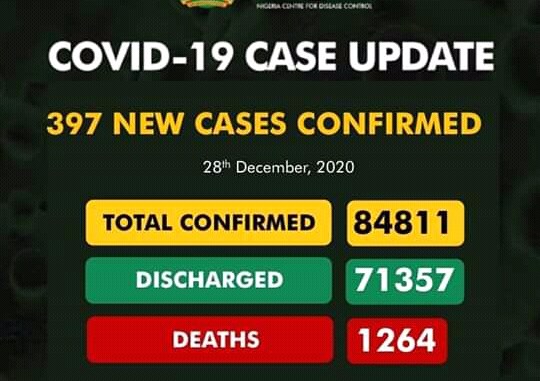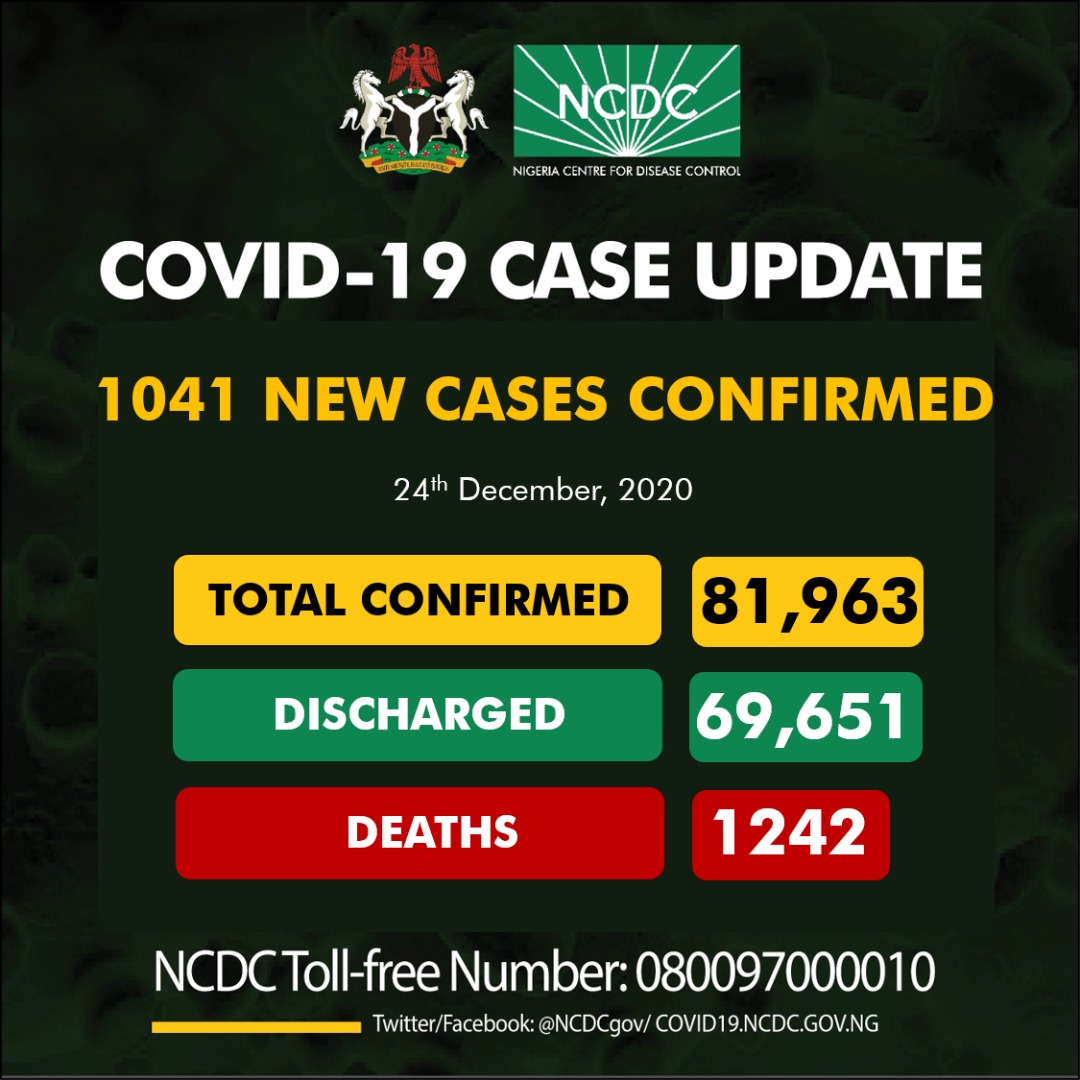Health
NCDC to strengthen infodemics management in response to disease outbreaks

The Nigeria Centre for Disease Control (NCDC) says it is working to strengthen infodemics management as part of national emergency preparedness and response framework.
The NCDC says it is working with full support from the World Health Organisation (WHO).
Dr Chinwe Ochu, Director of Prevention Programmes and Knowledge Management, NCDC, made the disclosure on Monday in Abuja.
He spoke at one of the nine pre-conference workshops organised ahead of the Nigerian Conference of Applied and field Epidemiology (NiCAFE) conference.
The pre-conference workshops which took place on July 26 were focused on skill-building and experience sharing.
The maiden Virtual Edition of the NiCAFE conference is scheduled to take place between July 27 and July 28, 2021 with the theme: “Building Back Better: COVID-19 and Other Disease Outbreaks”.
The News Agency of Nigerian (NAN) reports that COVID-19 is the first pandemic in history in which technology and social media are being used on a massive scale to keep people safe, informed, productive and connected.
“At the same time, the technology relied on to keep people connected and informed is enabling and amplifying an infodemic that continues to undermine the global response and jeopardize efforts by authorities to control the pandemic.”
Ochu speaking on “Managing Infodemics During Epidemics: COVID-19 as a Case Study”, he said that an infodemic was an overabundance of information, both online and offline.
“It includes deliberate attempts to disseminate wrong information to undermine the public health response and advance alternative agendas of groups or individuals.
“Mis and disinformation can be harmful to people’s physical and mental health, increase stigmatisation and threaten precious health gains.
“It can also lead to poor observance of public health measures, thus reducing their effectiveness and endangering the country’s ability to stop the pandemic.”
She advised journalists on tips to stay updated with verified information on infectious diseases especially in a time of crisis or conflict.
“Everyone has a role to play in managing rumours and misinformation; let’s work together to provide the public with evidence-based information to ensure their safety,” she said.
Dr Abdulraman Danjuma, WHO’s Infodemic Management Consultant, said that the outcome of collaborations among the national and sub-national governments as well as with partners and the private sector was to have an integrated infodemic management system in the country for addressing public health response.
Meanwhile, Dr Emily Collard of the Public Health, England, spoke on simulation exercise for emergency preparedness and response as part of the International Health Regulation (IHR), strengthening project.
She noted that simulation exercises were controlled, objective-driven activities used for evaluating emergency management processes, procedures or capabilities.
Speaking at a parallel session on the Use of Big Data for Epidemics, Mrs Nwando Mba, Director of Laboratory Services , stated that data informs policy and public health actions.
Mba, who represented the NCDC’s Director-General, added that data informs evidence and is the heartbeat of any outbreak response.
Declaring the pre-conference workshop on simulation exercises open, Dr John Oladejo, Director of Health Emergency Preparedness and Response, NCDC, said that drawing from the theme of the conference, NiCAFE was a great opportunity to build back better leveraging on lessons learnt from Nigeria’s response to the COVID-19 pandemic.
Our correspondent recalls that the conference provided an opportunity to discuss the epidemiology of infectious diseases in the country and the impact of these on regional and global health security.
The conference allowed speakers and attendees to share their experience and knowledge, demonstrate practical techniques and guidance in preventing, detecting and responding to infectious disease outbreaks.
It also provided an opportunity for capacity development through pre-conference workshops and networking.
The pre-conference workshops had parallels sessions.
The morning session included: Simulation Exercises as a Tool for Strengthening Epidemic Preparedness: Lessons Learnt from Nigeria’s Perspective – Public Health England.
“Using big data in epidemics – eHealth Africa.
“Managing infodemics during epidemics: COVID-19 as a case study – World Health Organization (WHO).
“Preventing Epidemics: Using the IHR Evaluation Tools for Outbreak Preparedness and Response Resolve to Save Lives”.
Health
KWSG flags off measle-rubella, polio vaccination campaign

- First Lady says it’s life-saving initiative, urges active participation
Stephen Olufemi Oni, Ilorin
Kwara State Government has launched an integrated vaccination campaign to prevent Measles Rubella and Polio diseases among vulnerable groups in the state.
The exercise, which will last for 10 days – beginning from Saturday 11th October 2025 — is expected to cover at least 1.8 million children whose ages range between 9 months and 14 years (for Measles Rubella vaccine) and zero to 5 years for oral polio vaccine.
The programme was organised by the Kwara State Primary Healthcare Development Agency in collaboration with UNICEF and World Health Organisation (WHO), among other development partners.
At the flag off ceremony in Ilorin, the state capital, Kwara’s First Lady, Ambassador Prof. Olufolake AbdulRazaq, said the initiative is not just a policy milestone but a life-saving intervention for Kwara children and families.
She called on all parents and guardians to present their children within the age range for the vaccination.
“I commend the Kwara State Primary Healthcare Development Agency and all development partners for the efforts that culminated in the launch of the roll out of Measles Rubella Vaccine in the state,” First Lady Ambassador Olufolake AbdulRazaq said.
She said the introduction of the measles-rubella (MRV) vaccine is essential and timely, considering the outbreaks of measles in some parts of the country.
According to her, Nigeria now contends with a reality in which only about 60 percent of children receive the first dose of measles vaccine, while the second dose coverage is as low as 38 percent, noting that this coverage gap is responsible for the outbreaks.
By launching MRV, the country, Kwara inclusive, stands the chance of closing a long-standing gap towards protecting every child, mother, and family, she added.
The First Lady enjoined relevant stakeholders, including traditional and religious leaders, community heads, and the media, to complement government’s efforts in propagating the benefits of measles rubella and polio vaccines.
Commissioner for Health, Dr Amina Ahmed El-Imam, said the campaign is a transformative public health initiative to save lives across the communities.
El-Imam, who was represented by the Permanent Secretary, Ministry of Health, Dr Abdullahi Taoheed, urged all stakeholders to commit resources and attention to raising awareness, mobilising communities, and overcoming any logistical or cultural barriers to vaccination.
Executive Secretary, State Primary Healthcare Development Agency, Prof Nusirat Elelu, said the agency is deploying 8,657 trained personnel, including health workers, supervisors, and security personnel to carry out the campaign.
“Measles remains one of the most contagious and fatal viral diseases affecting young children globally, despite the availability of a safe and highly effective vaccine,” she said.
“Between years 2000 and 2023, it is estimated that measles vaccination alone averted over 60 million deaths globally. Yet, the disease remains endemic in many developing countries, particularly Africa and Asia.”
Prof Elelu said Rubella poses a serious risk to pregnant women, such as miscarriage, fetal death, or the birth of infants with Congenital Rubella Syndrome (CRS).
Assuring that the agency will not rest on its oars to safeguard the people’s health, Elelu said immunization, ante-natal and all non-complicated delivery are given free of charge across primary healthcare centres (PHCs) in the state.
The Executive Secretary commended Governor AbdulRazaq for his huge investments in the health sector, and his Deputy, Mr Kayode Alabi, who is the
Chairman of the State Task Force on Immunization and PHC, for the untiring support.
“We are extremely grateful to Her Excellency, Amb. (Prof.) Olufolake AbdulRazaq, whose relentless advocacy for maternal and child health has been a beacon of hope for our communities,” she added.
Dr. Adeola-Musa of the National Primary Healthcare Development Agency enjoined community leaders and parents to embrace the exercise by mobilising children for vaccination.
Surveillance Officer for World Health Organization (WHO), Mrs Abdulkadir Rashidat, said the vaccines are safe, effective and suitable to protect the children, calling on all parents and community leaders to accord the vaccination teams the needed support to function.
Ibrahim Tsado Mohammed, a Social and Behaviour Change Specialist at
UNICEF, warned that measles, rubella, and polio continue to pose significant health threats to children despite global progress.
He implored the media and civil society organisations to help counter misinformation in some quarters and reduce hesitancy surrounding the vaccination campaign.
Some of the dignitaries at the event were the Deputy Chief Whip, Kwara House of Assembly, Hon. Mariam Yusuf Aladi; Chairman House Committee on Health, Hon. Seun Oguniyi; Cabinet members; Acting Head of Service, Kwara State, Mrs Shittu Olufunke Mercy; Chairman, State Civil Service Commission, Hajia Habibat Yusuf; Permanent Secretaries; Emir of Shonga, Dr Haliru Yahaya; Olupako of Share, Oba Olawale Haruna Ilufemiloye; and Balogun Alanamu of Ilorin, Dr Usman Abubakar Jos, represented by Alhaji Bolaji Ibrahim Alanamu.
Others were wife of the State Chief Judge, Mrs Olufunke Adebara; spouses of Chairmen of the 16 Local Governments; and wife of the State APC Chairman, Princess Ayodele Fagbemi.
End
Health
World Sight Day 2025: FG Urge to Prioritize Eye Health as 1.3m Nigerians estimated to be blind

From our Correspondent
The Chairman, National Eye Health Committee, Prof Afekhide Ernest Omoti has stressed the need for individuals, communities, and governments to prioritize vision care as a vital part of overall health and national development.
The medical expert disclosed that findings revealed that 1.3 million Nigerians are estimated to be blind with over 80% of these cases being preventable or treatable.
Prof. Omoti who is a consultant ophthalmologist and also the Chairman, Eye Health Committee of the Nigerian Medical Association (NMA), made the call as part of activities to commemorate the 2025 World Sight Day with theme, “Love Your Eyes”, “Love Your Eyes at work”, “Love Your Eyes Kids”, “Love Your Eyes – Protect the Future,”.
Prof. Omoti stated that the World Sight Day 2025 is a global event dedicated to raising awareness about the importance of eye health and the prevention of avoidable blindness.
Prof. Omoti also noted that in Nigeria, millions of Nigerians suffer from visual impairment, and many are at risk due to preventable causes.
“As we celebrate today, let us remember that vision is not just about sight; it is also about connection, opportunity, and the ability to navigate the world. Our eyes allow us to experience the beauty of life and our environment, from the smiles of our loved ones to the vibrant culture that surrounds us.
“This year’s theme, “Love Your Eyes”, “Love Your Eyes at work”, “Love Your Eyes Kids”, “Love Your Eyes – Protect the Future,” calls each of us – individuals, communities, and governments to action. This is because when we protect our eyes, we are not just safeguarding sight; we are securing productivity, learning, inclusion, dignity, and the future of our nation.
He emphasizes the urgent need for individuals, communities, and governments to prioritize vision care as a vital part of overall health and national development.”he said.
Speaking on the significance of the day, Prof Afekhide Ernest Omoti, a consultant Ophthalmologist, past chairman of Edo NMA and Chairman of the Eye Health Committee called on the public to take proactive steps toward protecting their vision.
He noted that eye health is not a privilege or a luxury but a human right, which, according to him, is also a cornerstone of national development.
“When we invest in eye care, we reduce poverty, boost education, and empower individuals to live full, productive lives. Little wonder that many of the sustainable development goals depend on good vision.
According to him, every Nigerian deserves access to affordable and quality eye care.
Prof. Omoti, while urging all Nigerian citizens to get their eyes tested regularly and to seek care early, especially for children and the elderly said over 1 billion people worldwide live with vision loss that could have been prevented or treated.
“Estimates in 2020 suggest that 24 million people in Nigeria were living with some form of vision loss, many unnecessarily. An estimated 4.25 million adults aged 40 and above have moderate to severe visual impairment, 1.3 million Nigerians are estimated to be blind with over 80% of these cases being preventable or treatable.
“Cataracts, glaucoma, refractive errors, tropical diseases, and diabetic retinopathy continue to rob our people both young and old of their sight, their confidence, and their economic potential. We can not afford to ignore this any longer.” Omoti said.
Health
Milestone; Kwara LG Declared Open Defecation Free by FG

Stephen Olufemi Oni, Ilorin
The Federal Ministry of Water Resources and Sanitation has officially declared Oke-Ero Local Government Area (LGA) in Kwara State as Open Defecation Free (ODF), following a comprehensive validation exercise conducted by the National Task Group on Sanitation (NTGS).
The validation exercise was carried out between 21st and 25th July, 2025 by the NTGS, during which Oke-Ero LGA was assessed in accordance with the revised national ODF protocol. Based on the findings, the LGA was found to have met all required indicators and was therefore approved for ODF status on 27th August, 2025.
The official communication of this development was conveyed to Mr. Olorunfemi Adewumi Oladipo, the General Manager of the Kwara State Rural Water Supply and Sanitation Agency (RUWASSA), through a formal letter authored by the Director of Water Quality Control and Sanitation at the Federal Ministry; Mrs. Elizabeth Ugoh. The letter was issued on behalf of the Minister of Water Resources and Sanitation.
Mrs Elisabeth Ugoh, who congratulated the Kwara State Government and the people of Oke-Ero on achieving this national milestone, noted that sanitation is a continuous activity.
The correspondence described the achievement as a significant step forward in the national effort to eradicate open defecation and commended the sustained efforts of the local government, community leaders, stakeholders, and sanitation partners.
It would be recalled that the NTGS validation team conducted detailed assessments across households, institutions, and public spaces in Oke-Ero LGA, confirming the absence of open defecation and the presence of functional sanitation facilities, hygiene awareness, and sustained behavioural change, all of which are prerequisites under the national ODF criteria.
As part of the formal process, the Minister, Prof. Engr. Joseph Terlumun Utsev, is expected to communicate this achievement in writing to Governor AbdulRahman AbdulRazaqn, as, in line with established national protocol, the Governor is expected to host an official event to commemorate the ODF declaration of Oke-Ero LGA.
Reacting to the development, the Commissioner for Water Resources, Hon. Yinusa Lade, lauded the milestone as a testament to the state’s unwavering commitment to improving sanitation and public health. He commended the people of Oke-Ero for their resilience, cooperation, and ownership of the sanitation initiatives, which he described as critical to the sustainability of this achievement.
Hon. Lade, who reiterated the State government’s commitment to scaling up similar interventions across other LGAs, noted that with Oke-Ero setting the pace, the Ministry will intensify efforts to ensure that the entire State is declared Open Defecation Free well ahead of the national 2030 target.
Responding to the announcement, Mr. Oladipo expressed appreciation for the recognition, describing it as a reflection of collaborative effort across multiple levels of governance and community participation. Mr Olorunfemi Oladipo reaffirmed RUWASSA’s continued commitment to supporting other LGAs in the State to achieve similar results.
Mr Oladipo also urged local authorities and stakeholders in Oke-Ero to ensure the sustainability of this status, by adhering to the recommendations outlined in the validation report, which has been enclosed with the official communication.
This development positions Kwara State as one of the leaders in sanitation progress and contributes meaningfully to Nigeria’s broader objective of eliminating open defecation nationwide by 2030, in alignment with the Sustainable Development Goals (SDGs).
End
-

 Uncategorized5 years ago
Uncategorized5 years agoFG, states urged to harness flooding for ranching, others with technology – Agbaje
-

 Headlines10 years ago
Headlines10 years agoBreaking: EFCC seals Borno House of Assembly, as Hon members take to their heels
-

 News12 years ago
News12 years agoNigeria Security Operatives Stage Manhunt For Homosexual Perpetrator
-

 News9 years ago
News9 years agoHow 21-year-old Girl fled community over accusation of lesbianism
-

 News10 years ago
News10 years agoYobe Gov Moves Against Deputy
-

 Opinion7 years ago
Opinion7 years ago7 signs she has friend zoned you
-
Technology4 years ago
Online job placement company headhunts women
-

 Headlines10 years ago
Headlines10 years agoBorno Dep Gov Abducts Another Church Leader









